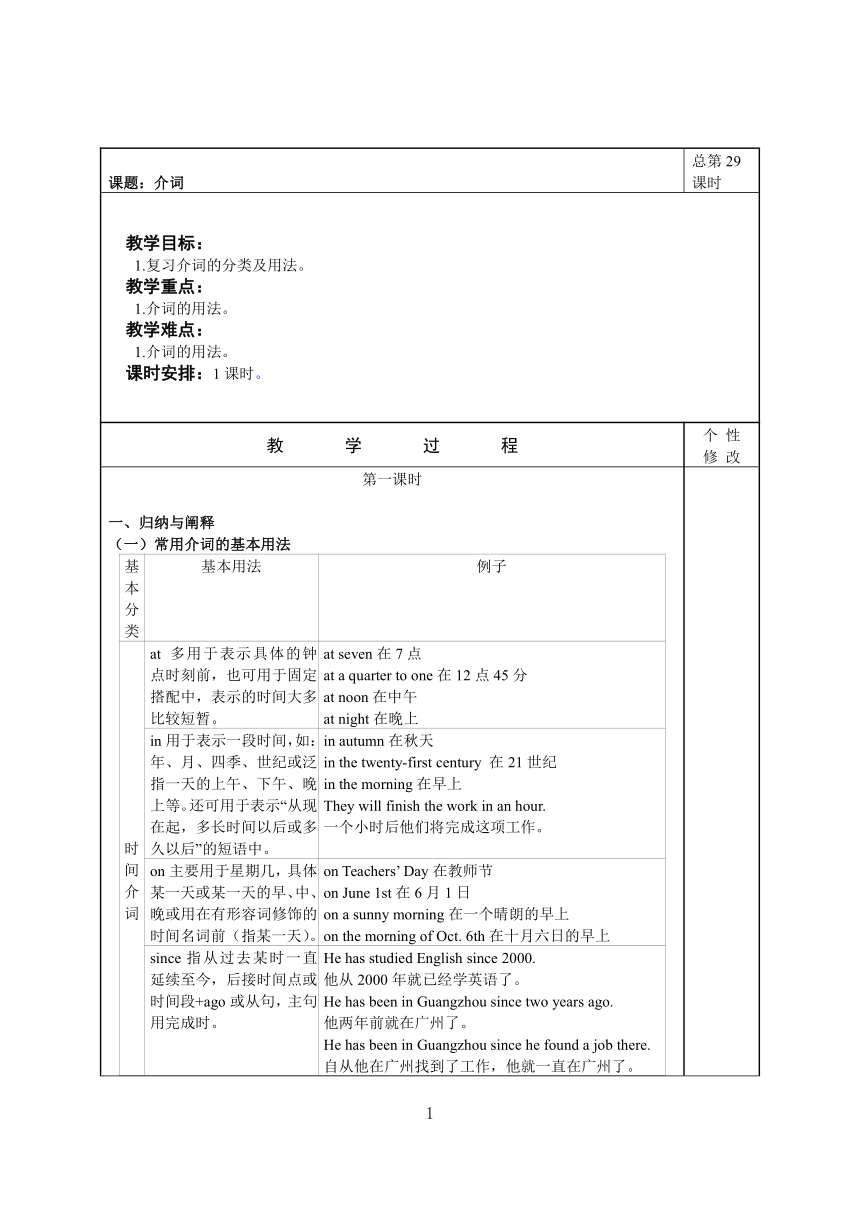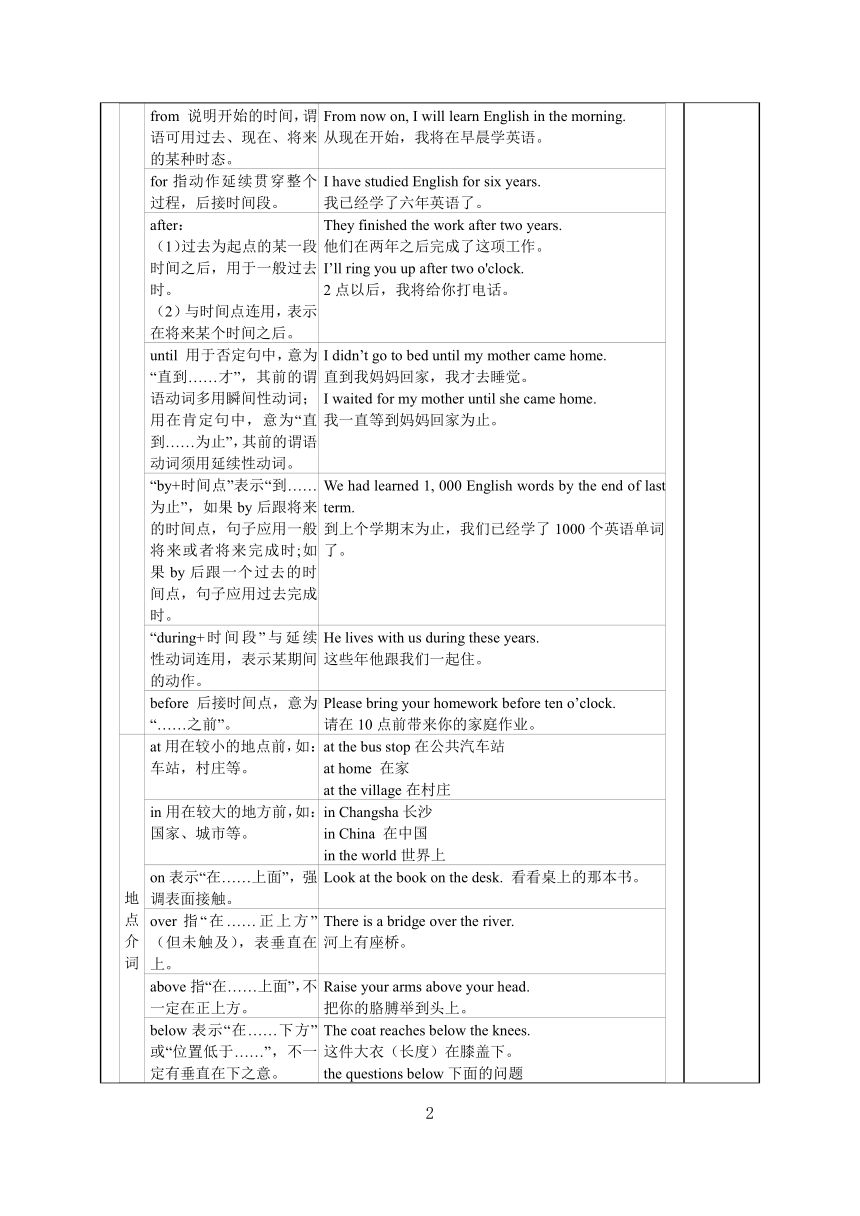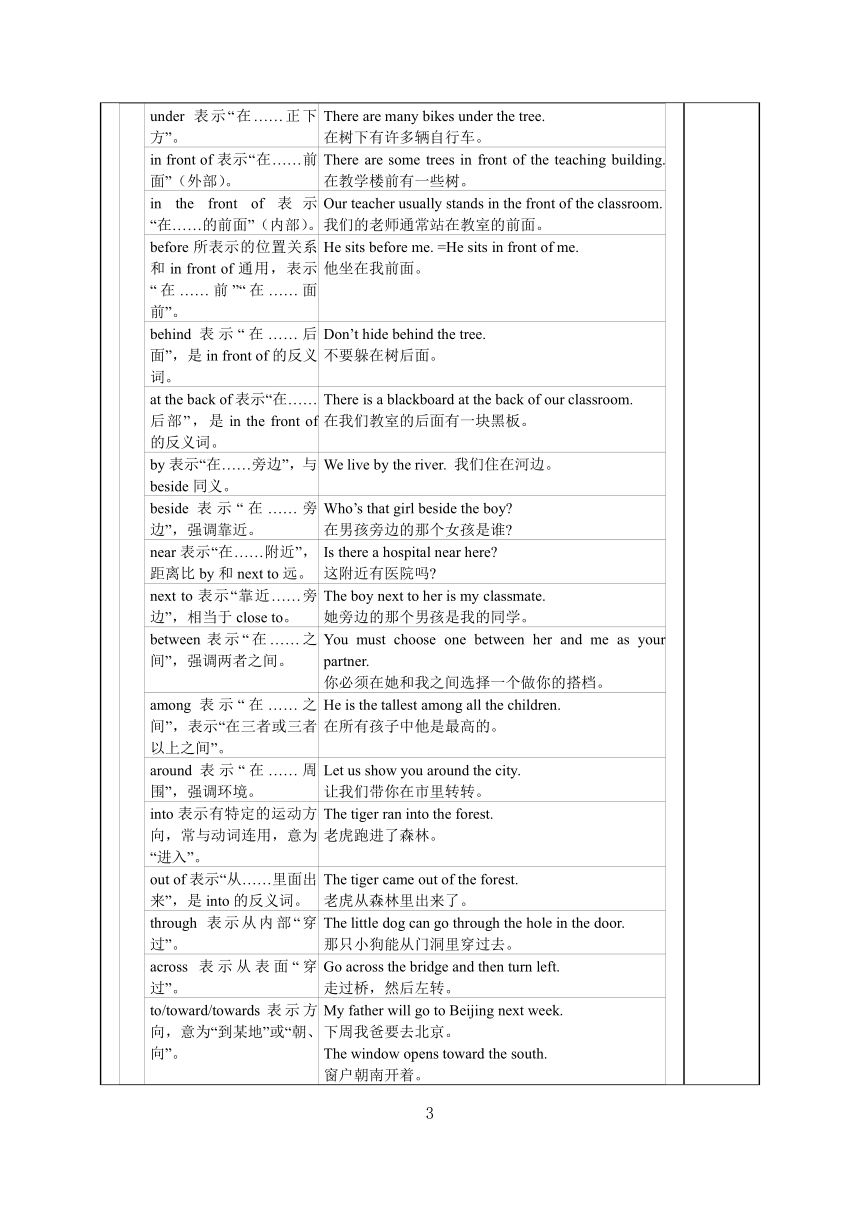5 语法聚焦之五 介词 2025年中考英语语法专题复习(人教版)
文档属性
| 名称 | 5 语法聚焦之五 介词 2025年中考英语语法专题复习(人教版) |

|
|
| 格式 | doc | ||
| 文件大小 | 487.5KB | ||
| 资源类型 | 教案 | ||
| 版本资源 | 人教新目标(Go for it)版 | ||
| 科目 | 英语 | ||
| 更新时间 | 2025-01-17 00:00:00 | ||
图片预览



文档简介
课题:介词 总第29课时
教学目标: 1.复习介词的分类及用法。
教学重点:
1.介词的用法。
教学难点:
1.介词的用法。
课时安排:1课时。
教 学 过 程 个 性 修 改
第一课时
一、归纳与阐释
(一)常用介词的基本用法
基本分类
基本用法
例子
时间介词
at 多用于表示具体的钟点时刻前,也可用于固定搭配中,表示的时间大多比较短暂。
at seven在7点
at a quarter to one在12点45分
at noon在中午
at night在晚上
in用于表示一段时间,如:年、月、四季、世纪或泛指一天的上午、下午、晚上等。还可用于表示“从现在起,多长时间以后或多久以后”的短语中。
in autumn在秋天
in the twenty-first century 在21世纪
in the morning在早上
They will finish the work in an hour.
一个小时后他们将完成这项工作。
on主要用于星期几,具体某一天或某一天的早、中、晚或用在有形容词修饰的时间名词前(指某一天)。
on Teachers’ Day在教师节
on June 1st在6月1日
on a sunny morning在一个晴朗的早上
on the morning of Oct. 6th在十月六日的早上
since指从过去某时一直延续至今,后接时间点或时间段+ago或从句,主句用完成时。
He has studied English since 2000.
他从2000年就已经学英语了。
He has been in Guangzhou since two years ago.
他两年前就在广州了。
He has been in Guangzhou since he found a job there.
自从他在广州找到了工作,他就一直在广州了。
from 说明开始的时间,谓语可用过去、现在、将来的某种时态。
From now on, I will learn English in the morning.
从现在开始,我将在早晨学英语。
for指动作延续贯穿整个过程,后接时间段。
I have studied English for six years.
我已经学了六年英语了。
after:
(1)过去为起点的某一段时间之后,用于一般过去时。
(2)与时间点连用,表示在将来某个时间之后。
They finished the work after two years.
他们在两年之后完成了这项工作。
I’ll ring you up after two o'clock.
2点以后,我将给你打电话。
until 用于否定句中,意为“直到……才”,其前的谓语动词多用瞬间性动词;用在肯定句中,意为“直到……为止”,其前的谓语动词须用延续性动词。
I didn’t go to bed until my mother came home.
直到我妈妈回家,我才去睡觉。
I waited for my mother until she came home.
我一直等到妈妈回家为止。
“by+时间点”表示“到……为止”,如果by后跟将来的时间点,句子应用一般将来或者将来完成时;如果by后跟一个过去的时间点,句子应用过去完成时。
We had learned 1, 000 English words by the end of last term.
到上个学期末为止,我们已经学了1000个英语单词了。
“during+时间段”与延续性动词连用,表示某期间的动作。
He lives with us during these years.
这些年他跟我们一起住。
before 后接时间点,意为“……之前”。
Please bring your homework before ten o’clock.
请在10点前带来你的家庭作业。
地点介词
at用在较小的地点前,如:车站,村庄等。
at the bus stop在公共汽车站
at home 在家
at the village在村庄
in用在较大的地方前,如:国家、城市等。
in Changsha长沙
in China 在中国
in the world世界上
on表示“在……上面”,强调表面接触。
Look at the book on the desk. 看看桌上的那本书。
over指“在……正上方”(但未触及),表垂直在上。
There is a bridge over the river.
河上有座桥。
above指“在……上面”,不一定在正上方。
Raise your arms above your head.
把你的胳膊举到头上。
below表示“在……下方”或“位置低于……”,不一定有垂直在下之意。
The coat reaches below the knees.
这件大衣(长度)在膝盖下。
the questions below下面的问题
under 表示“在……正下方”。
There are many bikes under the tree.
在树下有许多辆自行车。
in front of表示“在……前面”(外部)。
There are some trees in front of the teaching building. 在教学楼前有一些树。
in the front of表示“在……的前面”(内部)。
Our teacher usually stands in the front of the classroom.
我们的老师通常站在教室的前面。
before所表示的位置关系和in front of通用,表示“在……前”“在……面前”。
He sits before me. =He sits in front of me.
他坐在我前面。
behind表示“在……后面”,是in front of的反义词。
Don’t hide behind the tree.
不要躲在树后面。
at the back of表示“在……后部”,是in the front of的反义词。
There is a blackboard at the back of our classroom.
在我们教室的后面有一块黑板。
by表示“在……旁边”,与beside同义。
We live by the river. 我们住在河边。
beside表示“在……旁边”,强调靠近。
Who’s that girl beside the boy?
在男孩旁边的那个女孩是谁?
near表示“在……附近”,距离比by和next to远。
Is there a hospital near here?
这附近有医院吗?
next to表示“靠近……旁边”,相当于close to。
The boy next to her is my classmate.
她旁边的那个男孩是我的同学。
between表示“在……之间”,强调两者之间。
You must choose one between her and me as your partner.
你必须在她和我之间选择一个做你的搭档。
among表示“在……之间”,表示“在三者或三者以上之间”。
He is the tallest among all the children.
在所有孩子中他是最高的。
around表示“在……周围”,强调环境。
Let us show you around the city.
让我们带你在市里转转。
into表示有特定的运动方向,常与动词连用,意为“进入”。
The tiger ran into the forest.
老虎跑进了森林。
out of表示“从……里面出来”,是into的反义词。
The tiger came out of the forest.
老虎从森林里出来了。
through 表示从内部“穿过”。
The little dog can go through the hole in the door.
那只小狗能从门洞里穿过去。
across 表示从表面“穿过”。
Go across the bridge and then turn left.
走过桥,然后左转。
to/toward/towards表示方向,意为“到某地”或“朝、向”。
My father will go to Beijing next week.
下周我爸要去北京。
The window opens toward the south.
窗户朝南开着。
along表示“顺着,沿着”。
Come along this street. 沿着这条街一直走。
方式介词
with 表示使用的工具或手段,一般接具体的手段或工具。
You must do your exam with a pen.
你必须用钢笔考试。
by表示一种方式和方法,后面名词不加冠词,也无复数形式。by也可以修饰动名词。
They go to work by bike. 他们骑自行去上班。
The old man made a living by selling newspapers.
那位老人以卖报为生。
in表示使用的材料或语言。
You can write in black ink. 你可以用黑色墨水写。
What’s this in English? 这个用英语怎么说?
介词短语
介词+名词
in ink用墨水
in time 及时
in English用英语
in red 穿着红色衣服的
动词+介词
play with 和……一起玩
laugh at嘲笑
look after 照顾
wait for等待
pay for为……付钱
be+形容词+介词
be careful about 对……小心
be good at擅长于……
be angry with对……生气
be famous for…因……而出名
be proud of为……而骄傲
(二)易混介词的区别
1.表示地点的介词in, on和to的区别
in表示在某一地区之内的某方位(属于该范围);to表示在某一地区之外的某方位(不属于该范围且无毗邻关系);on表示与某地的毗邻关系(不属于该范围)。如:
Taiwan is in the southeast of China. 台湾位于中国的东南部。
Japan is to the east of China. 日本在中国的东边。
Russia is on the north of China. 俄罗斯毗邻中国的北边。
2.in和on的区别
(1)on the tree表示枝、叶、果实等长“在树上”。in the tree表示人或其他东西“在树上”。如:
There are some apples on the tree. 树上有些苹果。
There are some monkeys in the tree. 树上有些猴子。
(2)on the wall表示东西粘贴或挂“在墙上”。in the wall表示门、窗等嵌“在墙上”。如:
There is a picture on the wall. 墙上有一幅画。
There is a hole in the wall. 墙上有个洞。
3.across, through, over, past的区别
across和through都用于表示“穿过,越过”。across含有“从……表面穿过”之意,或指沿某一条线的方向而进行的动作,表示游渡、乘船过海或过河时用across;through含有“从……中间穿过”之意;over多指在空间范围上“超过”;past指“经过”。如:
He can swim across the river. 他能游过这条河。
She had to push her way through the crowd to get to her son.
她不得不挤过人群才能到她儿子跟前。
The plane flew over a line of mountains. 飞机从一座座山上飞过。
They walked past the post office. 他们从邮局旁边走过。
4.by, with和in表示“用”时的区别
(1)by意为“凭借工具或手段”,后常接交通工具/动名词。如:
by taxi乘的士
The girl made money by selling flowers. 这个女孩以卖花为生。
(2)with意为“用某种工具(指具体工具或手段)”。如:
The teacher told us not to do homework with a red pen.
老师要我们不要用红笔写作业。
(3)in意为 “用……”,后面跟语言。如:
Can you sing this song in English? 你能用英文唱这首歌吗?
5. by,in和on表旅行方式的区别
(1)by:①不涉及表示交通工具的名词时用by。如:by sea; by air。②涉及表示交通工具的名词,且该名词为单数形式,前面没有冠词或任何修饰语时用by。如:by ship;by plane。
(2)on或in:当旅行方式涉及特定的交通工具时用on或in,交通工具前应有冠词、物主代词、指示代词等修饰语。在开放型或半开放型或大型交通工具前用on,在小的封闭型交通工具前用in。如:on my bike; in a car。
二、分析与应用
1.[2024·安徽中考改编] To my surprise, my pain was gone within a week.
2.[2024·江苏省扬州市中考] You can’t eat an elephant all at once. Eat it one bite at a time.
3.[2024·四川成都中考] China Daily named “Growth” as its “Word of the Year 2023”.
4.[2024·四川凉山中考] —Maria, you have made such a great progress in English.
—Thanks, Ms. Chen. I can’t make it without your help.
5.[2024·四川凉山中考] —Did you have fun watching the volleyball game?
—No. A tall man stood in front of/ before me. I couldn't see the players at all.
6.[2024·四川自贡市中考] We can go to school by bike to make our city greener.
7.[2024·云南省中考] During/ At the Spring Festival, lanterns can be seen almost everywhere in my hometown.
8.[2024·黑龙江齐齐哈尔中考] Walking on tiptoes(脚趾)is good for your eyesight. It can fight against eyesight troubles.
9.[2024·江苏南京一模] The Dragon Boat Festival of this year falls on June 10th.
10.[2024·黑龙江齐齐哈尔中考] She was walking across the bridge when, suddenly, two cars entered from both sides.
11.[2024·重庆中考] More than 100, 000 people cheered at/ for the breathtaking moment when 3, 000drones(无人机)flew over Chaotianmen on the Chinese New Year Eve.
12.[2024·江苏宿迁中考] Nowadays, making tea around a stove(围炉煮茶)has become popular among/ with young people.
13.—The weather in Kunming is so pleasant all year round that people enjoy the life there.
—Sure. It’s famous as “Spring City” in China.
14.—Do you know Chang'e-5 probe (探测器)?
—Of course. I hope we can work on the moon like it one day.
15.[2024·江苏盐城中考] She often had energetic walks with her family through the nearby
woods.
板书设计:
作业布置:作业手册语法聚焦之五:介词相关习题。
教学反思
教学目标: 1.复习介词的分类及用法。
教学重点:
1.介词的用法。
教学难点:
1.介词的用法。
课时安排:1课时。
教 学 过 程 个 性 修 改
第一课时
一、归纳与阐释
(一)常用介词的基本用法
基本分类
基本用法
例子
时间介词
at 多用于表示具体的钟点时刻前,也可用于固定搭配中,表示的时间大多比较短暂。
at seven在7点
at a quarter to one在12点45分
at noon在中午
at night在晚上
in用于表示一段时间,如:年、月、四季、世纪或泛指一天的上午、下午、晚上等。还可用于表示“从现在起,多长时间以后或多久以后”的短语中。
in autumn在秋天
in the twenty-first century 在21世纪
in the morning在早上
They will finish the work in an hour.
一个小时后他们将完成这项工作。
on主要用于星期几,具体某一天或某一天的早、中、晚或用在有形容词修饰的时间名词前(指某一天)。
on Teachers’ Day在教师节
on June 1st在6月1日
on a sunny morning在一个晴朗的早上
on the morning of Oct. 6th在十月六日的早上
since指从过去某时一直延续至今,后接时间点或时间段+ago或从句,主句用完成时。
He has studied English since 2000.
他从2000年就已经学英语了。
He has been in Guangzhou since two years ago.
他两年前就在广州了。
He has been in Guangzhou since he found a job there.
自从他在广州找到了工作,他就一直在广州了。
from 说明开始的时间,谓语可用过去、现在、将来的某种时态。
From now on, I will learn English in the morning.
从现在开始,我将在早晨学英语。
for指动作延续贯穿整个过程,后接时间段。
I have studied English for six years.
我已经学了六年英语了。
after:
(1)过去为起点的某一段时间之后,用于一般过去时。
(2)与时间点连用,表示在将来某个时间之后。
They finished the work after two years.
他们在两年之后完成了这项工作。
I’ll ring you up after two o'clock.
2点以后,我将给你打电话。
until 用于否定句中,意为“直到……才”,其前的谓语动词多用瞬间性动词;用在肯定句中,意为“直到……为止”,其前的谓语动词须用延续性动词。
I didn’t go to bed until my mother came home.
直到我妈妈回家,我才去睡觉。
I waited for my mother until she came home.
我一直等到妈妈回家为止。
“by+时间点”表示“到……为止”,如果by后跟将来的时间点,句子应用一般将来或者将来完成时;如果by后跟一个过去的时间点,句子应用过去完成时。
We had learned 1, 000 English words by the end of last term.
到上个学期末为止,我们已经学了1000个英语单词了。
“during+时间段”与延续性动词连用,表示某期间的动作。
He lives with us during these years.
这些年他跟我们一起住。
before 后接时间点,意为“……之前”。
Please bring your homework before ten o’clock.
请在10点前带来你的家庭作业。
地点介词
at用在较小的地点前,如:车站,村庄等。
at the bus stop在公共汽车站
at home 在家
at the village在村庄
in用在较大的地方前,如:国家、城市等。
in Changsha长沙
in China 在中国
in the world世界上
on表示“在……上面”,强调表面接触。
Look at the book on the desk. 看看桌上的那本书。
over指“在……正上方”(但未触及),表垂直在上。
There is a bridge over the river.
河上有座桥。
above指“在……上面”,不一定在正上方。
Raise your arms above your head.
把你的胳膊举到头上。
below表示“在……下方”或“位置低于……”,不一定有垂直在下之意。
The coat reaches below the knees.
这件大衣(长度)在膝盖下。
the questions below下面的问题
under 表示“在……正下方”。
There are many bikes under the tree.
在树下有许多辆自行车。
in front of表示“在……前面”(外部)。
There are some trees in front of the teaching building. 在教学楼前有一些树。
in the front of表示“在……的前面”(内部)。
Our teacher usually stands in the front of the classroom.
我们的老师通常站在教室的前面。
before所表示的位置关系和in front of通用,表示“在……前”“在……面前”。
He sits before me. =He sits in front of me.
他坐在我前面。
behind表示“在……后面”,是in front of的反义词。
Don’t hide behind the tree.
不要躲在树后面。
at the back of表示“在……后部”,是in the front of的反义词。
There is a blackboard at the back of our classroom.
在我们教室的后面有一块黑板。
by表示“在……旁边”,与beside同义。
We live by the river. 我们住在河边。
beside表示“在……旁边”,强调靠近。
Who’s that girl beside the boy?
在男孩旁边的那个女孩是谁?
near表示“在……附近”,距离比by和next to远。
Is there a hospital near here?
这附近有医院吗?
next to表示“靠近……旁边”,相当于close to。
The boy next to her is my classmate.
她旁边的那个男孩是我的同学。
between表示“在……之间”,强调两者之间。
You must choose one between her and me as your partner.
你必须在她和我之间选择一个做你的搭档。
among表示“在……之间”,表示“在三者或三者以上之间”。
He is the tallest among all the children.
在所有孩子中他是最高的。
around表示“在……周围”,强调环境。
Let us show you around the city.
让我们带你在市里转转。
into表示有特定的运动方向,常与动词连用,意为“进入”。
The tiger ran into the forest.
老虎跑进了森林。
out of表示“从……里面出来”,是into的反义词。
The tiger came out of the forest.
老虎从森林里出来了。
through 表示从内部“穿过”。
The little dog can go through the hole in the door.
那只小狗能从门洞里穿过去。
across 表示从表面“穿过”。
Go across the bridge and then turn left.
走过桥,然后左转。
to/toward/towards表示方向,意为“到某地”或“朝、向”。
My father will go to Beijing next week.
下周我爸要去北京。
The window opens toward the south.
窗户朝南开着。
along表示“顺着,沿着”。
Come along this street. 沿着这条街一直走。
方式介词
with 表示使用的工具或手段,一般接具体的手段或工具。
You must do your exam with a pen.
你必须用钢笔考试。
by表示一种方式和方法,后面名词不加冠词,也无复数形式。by也可以修饰动名词。
They go to work by bike. 他们骑自行去上班。
The old man made a living by selling newspapers.
那位老人以卖报为生。
in表示使用的材料或语言。
You can write in black ink. 你可以用黑色墨水写。
What’s this in English? 这个用英语怎么说?
介词短语
介词+名词
in ink用墨水
in time 及时
in English用英语
in red 穿着红色衣服的
动词+介词
play with 和……一起玩
laugh at嘲笑
look after 照顾
wait for等待
pay for为……付钱
be+形容词+介词
be careful about 对……小心
be good at擅长于……
be angry with对……生气
be famous for…因……而出名
be proud of为……而骄傲
(二)易混介词的区别
1.表示地点的介词in, on和to的区别
in表示在某一地区之内的某方位(属于该范围);to表示在某一地区之外的某方位(不属于该范围且无毗邻关系);on表示与某地的毗邻关系(不属于该范围)。如:
Taiwan is in the southeast of China. 台湾位于中国的东南部。
Japan is to the east of China. 日本在中国的东边。
Russia is on the north of China. 俄罗斯毗邻中国的北边。
2.in和on的区别
(1)on the tree表示枝、叶、果实等长“在树上”。in the tree表示人或其他东西“在树上”。如:
There are some apples on the tree. 树上有些苹果。
There are some monkeys in the tree. 树上有些猴子。
(2)on the wall表示东西粘贴或挂“在墙上”。in the wall表示门、窗等嵌“在墙上”。如:
There is a picture on the wall. 墙上有一幅画。
There is a hole in the wall. 墙上有个洞。
3.across, through, over, past的区别
across和through都用于表示“穿过,越过”。across含有“从……表面穿过”之意,或指沿某一条线的方向而进行的动作,表示游渡、乘船过海或过河时用across;through含有“从……中间穿过”之意;over多指在空间范围上“超过”;past指“经过”。如:
He can swim across the river. 他能游过这条河。
She had to push her way through the crowd to get to her son.
她不得不挤过人群才能到她儿子跟前。
The plane flew over a line of mountains. 飞机从一座座山上飞过。
They walked past the post office. 他们从邮局旁边走过。
4.by, with和in表示“用”时的区别
(1)by意为“凭借工具或手段”,后常接交通工具/动名词。如:
by taxi乘的士
The girl made money by selling flowers. 这个女孩以卖花为生。
(2)with意为“用某种工具(指具体工具或手段)”。如:
The teacher told us not to do homework with a red pen.
老师要我们不要用红笔写作业。
(3)in意为 “用……”,后面跟语言。如:
Can you sing this song in English? 你能用英文唱这首歌吗?
5. by,in和on表旅行方式的区别
(1)by:①不涉及表示交通工具的名词时用by。如:by sea; by air。②涉及表示交通工具的名词,且该名词为单数形式,前面没有冠词或任何修饰语时用by。如:by ship;by plane。
(2)on或in:当旅行方式涉及特定的交通工具时用on或in,交通工具前应有冠词、物主代词、指示代词等修饰语。在开放型或半开放型或大型交通工具前用on,在小的封闭型交通工具前用in。如:on my bike; in a car。
二、分析与应用
1.[2024·安徽中考改编] To my surprise, my pain was gone within a week.
2.[2024·江苏省扬州市中考] You can’t eat an elephant all at once. Eat it one bite at a time.
3.[2024·四川成都中考] China Daily named “Growth” as its “Word of the Year 2023”.
4.[2024·四川凉山中考] —Maria, you have made such a great progress in English.
—Thanks, Ms. Chen. I can’t make it without your help.
5.[2024·四川凉山中考] —Did you have fun watching the volleyball game?
—No. A tall man stood in front of/ before me. I couldn't see the players at all.
6.[2024·四川自贡市中考] We can go to school by bike to make our city greener.
7.[2024·云南省中考] During/ At the Spring Festival, lanterns can be seen almost everywhere in my hometown.
8.[2024·黑龙江齐齐哈尔中考] Walking on tiptoes(脚趾)is good for your eyesight. It can fight against eyesight troubles.
9.[2024·江苏南京一模] The Dragon Boat Festival of this year falls on June 10th.
10.[2024·黑龙江齐齐哈尔中考] She was walking across the bridge when, suddenly, two cars entered from both sides.
11.[2024·重庆中考] More than 100, 000 people cheered at/ for the breathtaking moment when 3, 000drones(无人机)flew over Chaotianmen on the Chinese New Year Eve.
12.[2024·江苏宿迁中考] Nowadays, making tea around a stove(围炉煮茶)has become popular among/ with young people.
13.—The weather in Kunming is so pleasant all year round that people enjoy the life there.
—Sure. It’s famous as “Spring City” in China.
14.—Do you know Chang'e-5 probe (探测器)?
—Of course. I hope we can work on the moon like it one day.
15.[2024·江苏盐城中考] She often had energetic walks with her family through the nearby
woods.
板书设计:
作业布置:作业手册语法聚焦之五:介词相关习题。
教学反思
同课章节目录
- 词法
- 名词
- 动词和动词短语
- 动词语态
- 动词时态
- 助动词和情态动词
- 非谓语动词
- 冠词
- 代词
- 数词和量词
- 形容词副词及其比较等级
- 介词和介词短语
- 连词和感叹词
- 构词法
- 相似、相近词比较
- 句法
- 陈述句
- 一般疑问句和否定疑问句
- 特殊疑问句及选择疑问句
- 反意疑问句
- 存在句(There be句型)
- 宾语从句
- 定语从句
- 状语从句
- 主谓一致问题
- 简单句
- 并列句
- 复合句
- 主谓一致
- 主、表语从句
- 名词性从句
- 直接引语和间接引语
- 虚拟语气
- 感叹句
- 强调句
- 倒装句
- 祈使句
- 句子的成分
- 句子的分类
- 题型专区
- 单项选择部分
- 易错题
- 完形填空
- 阅读理解
- 词汇练习
- 听说训练
- 句型转换
- 补全对话
- 短文改错
- 翻译
- 书面表达
- 任务型阅读
- 语法填空
- 其他资料
